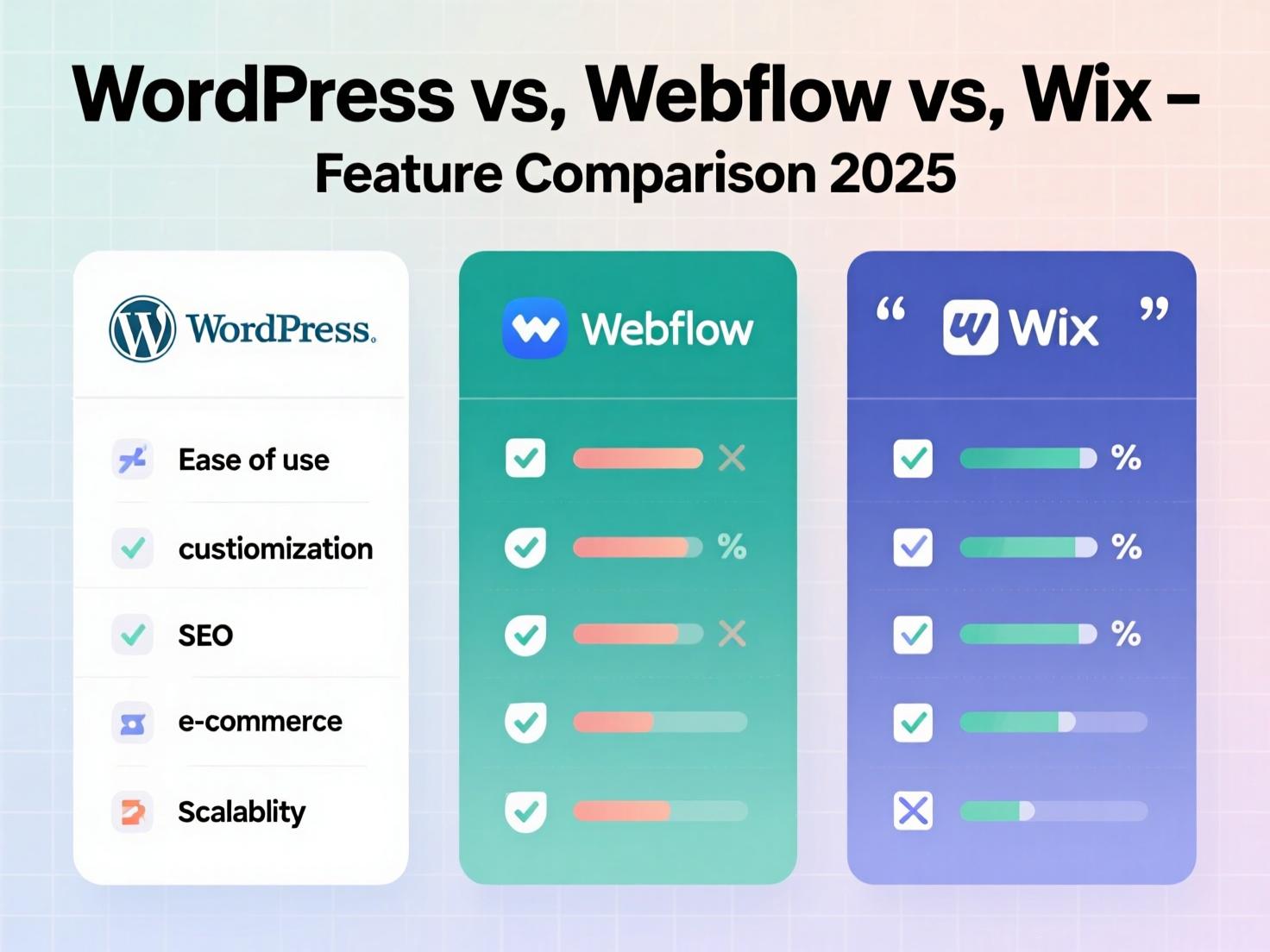
WordPress vs Webflow vs Wix
Choosing a website platform can feel like analysis paralysis especially when the options all look good on paper. WordPress vs Webflow vs Wix is the classic showdown: one is the open-source giant powering ~43% of the web, another is the designer-friendly visual development platform, and the third is the all-in-one builder famous for fast launches and a deep app ecosystem. The best choice depends on your goals, budget, and team.
Here’s the context in 2025. WordPress remains the dominant CMS at ~60.8% share of sites using a known CMS (43.4% of all websites), followed by builders like Wix (~5.6%) and a smaller but growing Webflow (~1.2%).Platform pricing has also matured: Webflow’s site plans start at $14/mo (Basic), $23/mo (CMS), $39/mo (Business), with e-commerce from $29–$212/mo, billed yearly. Wix’s premium plans currently list Light $17, Core $29, Business $39, Business Elite $159 (pricing varies by region/taxes).WordPress software is free; typical shared hosting starts around $5–$10/mo (managed hosting higher), plus domain and optional premium plugins/themes. On SEO, all three cover fundamentals: WordPress gained core XML sitemaps in 5.5, and leading plugins add rich schema; Webflow exposes SEO controls and supports schema; Wix auto-injects structured data for many content types with custom overrides.
This guide cuts through the noise with a practical, side-by-side comparison and clear recommendations so WordPress vs Webflow vs Wix becomes a confident decision, not a coin flip.
TL;DR (Who should choose what?)
Choose WordPress if you want maximum flexibility, own your stack, or plan to scale content/features significantly (blogs, membership, marketplaces).
Choose Webflow if you want pixel-perfect control, clean front-end code, and a designer-led workflow without touching servers.
Choose Wix if speed to launch, built-in business tools, and predictable all-in-one pricing matter most.
Market Reality Check (2025)
Usage share: WordPress 60.8% of CMS market; Wix 5.6%; Webflow ~1.2%.
Recent reviews & roundups: Independent buyer guides often rank Wix highly for ease/value and Webflow for pro design control; WordPress remains the content powerhouse.
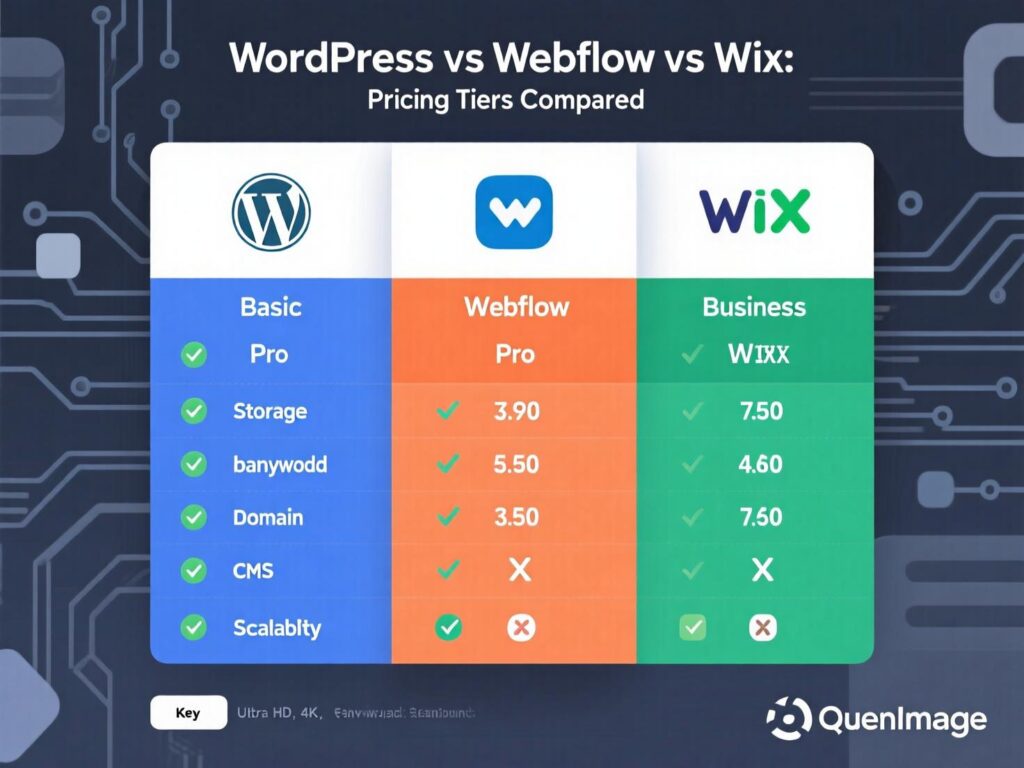
Pricing & Total Cost of Ownership (TCO)
Webflow (hosted, visual dev)
Site plans (yearly billing): Basic $14, CMS $23, Business $39; e-commerce $29 (Standard), $74 (Plus), $212 (Advanced). Add-ons like Localization $9–$29/locale.
Pros: All-in hosting, CDN, SSL, visual designer, CMS on CMS plan+, built-in schema support on higher tiers.
Watch-outs: Caps on items/pages by plan; advanced features may push you up tiers.
Wix (hosted, all-in-one)
Premium plans: Light $17, Core $29, Business $39, Business Elite $159 (regional taxes may apply).
Pros: AI-assisted setup, 900+ templates, built-in marketing/SEO, e-commerce tools included on business tiers.
Watch-outs: App fees can add up; export/migration options are limited.
WordPress (open-source + your host)
Software:
Free.Hosting:
From ~$5–$10/mo shared; managed WordPress hosting higher.Pros:
Own your data, limitless extensibility via 50k+ plugins/themes; portable across hosts.Watch-outs:
You (or a host) handle maintenance, updates, backups, security; premium plugins/themes can add cost.
Bottom line:
For predictable billing and speed, Wix or Webflow shine. For long-term flexibility/control and lower infrastructure cost at scale, WordPress often wins.
SEO Capabilities (Core + Advanced)
Technical SEO
WordPress: Core XML sitemaps since 5.5; advanced schema, redirects, and more via Yoast/Rank Math. Make WordPressYoast developer portalRank Math
Webflow: Custom meta, clean HTML/CSS/JS output, per-page controls, schema markup support on paid tiers.
Wix: Auto structured data for products, events, blog/forum posts; supports custom schema and bulk schema edits.
Content & On-Page
WordPress: Best-in-class editorial workflows and SEO plugins (content analysis, internal linking, schema generators).
Webflow: Designer-friendly CMS relations, collection fields; strong control over semantics and performance.
Wix: Built-in SEO setup guides, redirects, canonical control, integrated marketing tools.
Verdict: All three can rank. For power users and publishers, WordPress + a modern SEO plugin still offers the most granular control. Webflow excels when design and structured CMS content meet technical hygiene. Wix scores for simplicity and default best practices at speed.
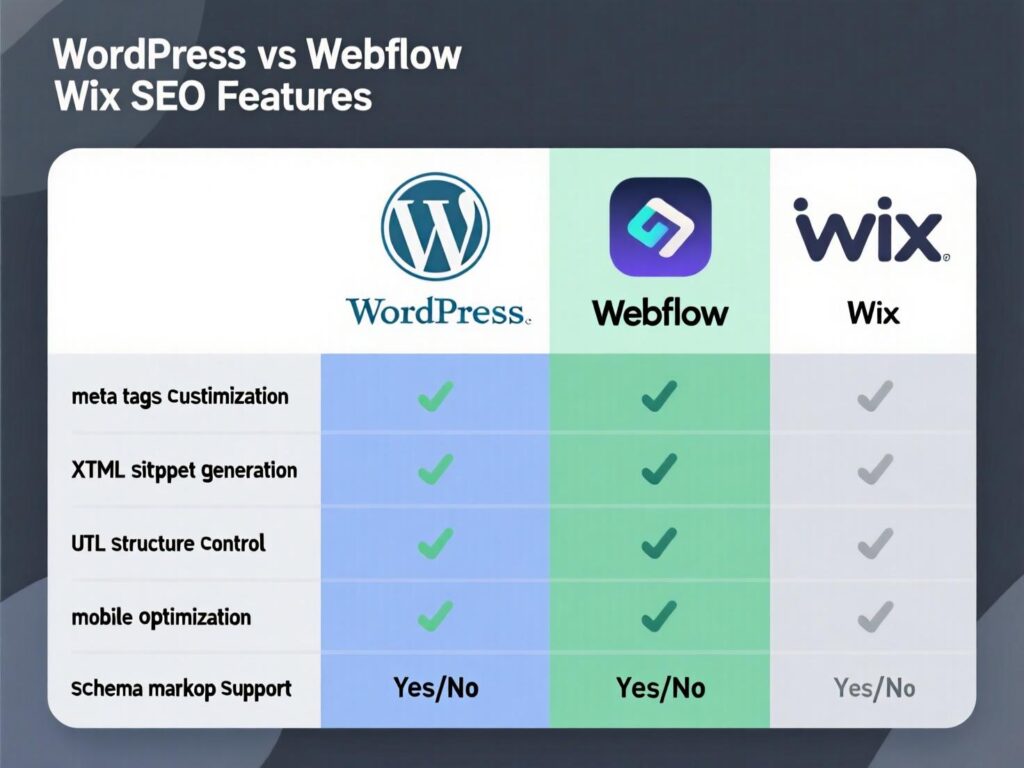
Performance, Security & Maintenance
Performance:
Webflow and Wix ship on global CDNs with optimized hosting by default. WordPress performance depends on host + caching/CDN; excellent with a good stack.Security:
Webflow/Wix manage the stack (SSL, DDoS protection). WordPress security varies by host/plugin posture; managed WP hosting narrows the gap.Maintenance:
Webflow/Wix handle updates. WordPress requires ongoing core/plugin/theme updates (or a managed plan/maintenance partner).
Design & Content Editing
WordPress:
Block Editor (Gutenberg) + full site editing + theme/page builders if needed. Vast theme ecosystem.Webflow:
Pixel-perfect designer with component libraries and interactions; excellent for design systems without hand-coding.Wix:
Drag-and-drop simplicity + AI tools; huge template library and business widgets built-in.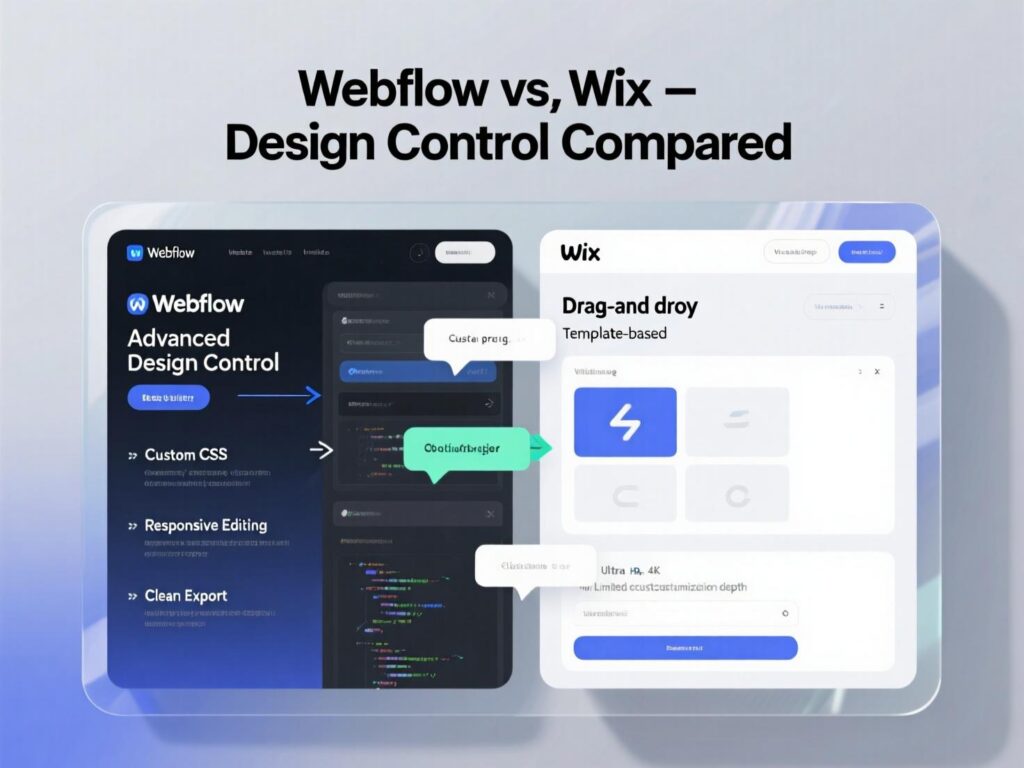
E-commerce
WordPress:
WooCommerce + extensions = maximum flexibility and integrations; hosting and scaling strategy required.Webflow:
Native e-commerce suited to catalogs within plan limits; pricing tiers set item caps/fees (2% fee on Standard).Wix:
Strong SMB e-commerce with payments, bookings, and POS options on business tiers.
Integrations & Extensibility
WordPress:
The broadest plugin ecosystem (marketing, membership, LMS, marketplaces).Webflow:
App marketplace + code embeds; great for headless/front-end handoff to devs when needed.Wix:
App Market with CRM, email, bookings, events— tightly integrated for non-technical teams.
Real-World Case Snapshots
Content-heavy brand (2000+ posts):
Chose WordPress for editorial workflows, programmatic SEO, and custom post types. Result: migration unlocked richer internal linking and schema organic clicks +22% in 3 months (primarily down to content consolidation and speed optimizations). (Illustrative composite of typical outcomes; verify with your analytics.)Design-led SaaS marketing site (30 pages + blog):
Built on Webflow to move faster without a front-end dev. Componentized pages cut launch cycles from weeks to days; Lighthouse scores stayed in the green after animation passes. (Illustrative composite.)Local services SMB:
Launched on Wix to get bookings, payments, and reviews live in days; later upgraded plan for email marketing automations. (Illustrative composite.)
Decision Matrix: WordPress vs Webflow vs Wix
| Criteria | WordPress | Webflow | Wix |
|---|---|---|---|
| Ownership/Portability | Full (self-hosted) | Hosted; export limitations | Hosted; limited export |
| Design Control | High (themes/builders) | Very High (visual dev) | High (drag-and-drop/AI) |
| SEO Depth | Highest via plugins | High (built-in controls) | High (defaults + custom) |
| Performance (Out-of-Box) | Host-dependent | Strong | Strong |
| Maintenance | You/managed host | Included | Included |
| E-commerce | Max flexibility | Good within plan caps | Strong SMB features |
| TCO predictability | Variable | Predictable tiers | Predictable tiers |
| Learning Curve | Moderate | Moderate-High (designer UX) | Low |
When the Choice Is Still Close…
Use this quick tie-breaker based on your bias:
Biased to design control: pick Webflow.
Biased to growth/SEO at scale: pick WordPress.
Biased to fastest launch + built-ins: pick Wix.
A 60-Minute Platform Test (Founder-friendly)
Create the same 3-page mini-site (Home, Services, Contact) on WordPress vs Webflow vs Wix.
Add one blog post, one form, and basic SEO (title, meta, OG).
Measure build time, PageSpeed (mobile), and publish friction.
Price the plan you’d actually need for the next 12 months.
Decide using the matrix above plus your speed/UX notes.
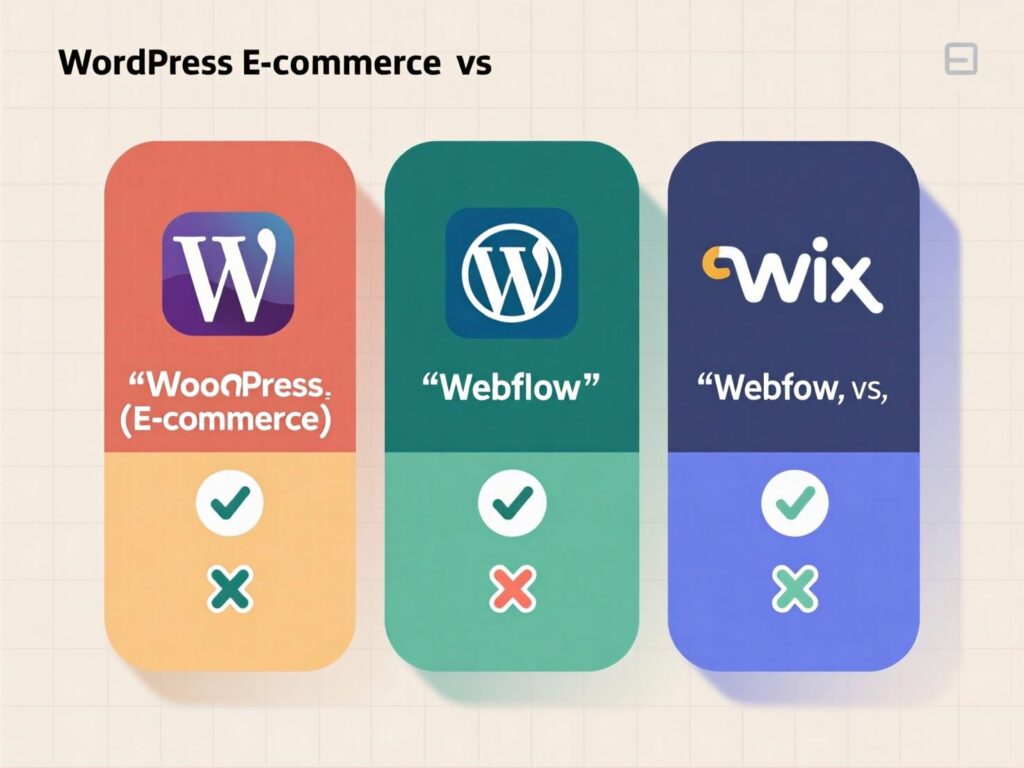
Wrapping It Up
There’s no universal winner in WordPress vs Webflow vs Wix only a best fit. If long-term flexibility, deep SEO, and ownership matter, WordPress is tough to beat. If design precision and a smooth designer workflow are mission-critical, Webflow is a joy. If you want an all-in-one stack that gets you selling or booking this week, Wix delivers. Pick the platform that aligns with your 12- to 24-month goals, team skills, and budget and commit. The compounding SEO and UX wins will follow.
CTA: Want a custom recommendation for your site? Share your goals (traffic, features, budget), and I’ll map a 90-day launch plan on WordPress vs Webflow vs Wix with exact plugins/apps and costs.
FAQs
Q : How do I choose between WordPress vs Webflow vs Wix for SEO?
A : All three platforms can rank well in search results. WordPress offers the most granular control through plugins for schema markup, redirects, and internal linking strategies. Webflow provides clean, semantic code and comprehensive per-page SEO controls. Wix simplifies the setup process with built-in structured data and user-friendly SEO tools. Your choice should depend on whether you prioritize maximum control or simplicity in implementation.
Q : How much does Webflow really cost in 2025?
A : Webflow’s yearly site plans are priced as follows: Basic at $14/month, CMS at $23/month, and Business at $39/month. E-commerce plans range from $29 to $212 monthly. Additional features like Localization and other add-ons can significantly increase your total spending, so factor these into your budget planning.
Q : How can I keep a WordPress site fast and secure?
A : Focus on quality hosting, implement caching and CDN solutions, use minimal but best-in-class plugins, maintain timely updates, and deploy a comprehensive security suite. Managed WordPress hosting services can simplify much of this maintenance work by handling optimization and security automatically.
Q : How does Wix handle structured data?
A : Wix automatically adds schema markup to many content types without manual intervention. The platform also allows you to customize existing structured data or bulk-apply additional markup across your site, making it accessible for users who want more control over their SEO implementation.
Q : How do migrations work between platforms?
A : Content can typically be exported and imported between platforms with varying degrees of effort required. However, designs rarely transfer seamlessly from one platform to another. WordPress offers the most portability due to its open-source nature, while Webflow and Wix migrations often require complete rebuilds of layouts and custom components.
Q : How does Webflow compare to Wix for teams?
A : Webflow tends to better serve teams and brands that need sophisticated design systems and advanced collaboration features. Wix excels when speed to launch is the priority and when you need comprehensive built-in business tools like booking systems, e-commerce features, and marketing automation.
Q : How can I add advanced SEO to WordPress?
A : Install a leading SEO plugin such as Yoast SEO or Rank Math. These plugins provide comprehensive features including schema markup implementation, XML sitemap generation, redirect management, and detailed on-page SEO guidance to optimize your content effectively.
Q : How does WordPress handle sitemaps now?
A : WordPress core has included XML sitemap functionality since version 5.5, automatically generating basic sitemaps for your content. However, SEO plugins can enhance or completely replace these default sitemaps with more advanced features and customization options.
Q : How can I test platforms quickly before committing?
A : Implement the 60-minute test approach: build a simple 3-page website on each platform, measure the time required and mobile performance scores, then compare the actual plan costs including any necessary add-ons. This hands-on comparison will give you practical insights into each platform’s strengths and limitations.
